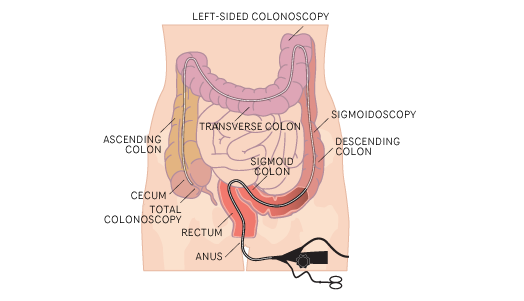Rectosigmoidoscopy
Rectosigmoidoscopy is a procedure similar to colonoscopy, except that only examines the rectum and the lower part of the colon (the sigmoid colon plus part of the descending colon).
Colonoscopy, on the other hand, looks at the whole colon and rectum.
The flexible tube used in this test is called a sigmoidoscope (length of about 60cm).
Like the colonoscope, it illuminates the interior of the intestine as it moves while sending images to an external monitor, where the doctor can observe them carefully.
Injection of air expands the colon for better visibility, and specialized tools can be passed through the hollow sigmoidoscope to collect biopsies from lesions or extract polyps.

Rectosigmoidoscopy is a simpler exam than colonoscopy; it can be a little uncomfortable but should cause no pain. As such it is an easier exam for patients - especially for those with complications or older. Rectosigmoidoscopy also has less risk of intestinal perforation, and it is typically performed without anesthesia.
However, it only identifies a portion of the polyps diagnosed by colonoscopy and is not indicated to detect some abnormalities, as high-grade dysplasia. As with colonoscopy, you need medication to prepare the colon for the exam.
A third type of exam - left sided colonoscopy - goes further, visualizing the entire rectum and ascending colon.


